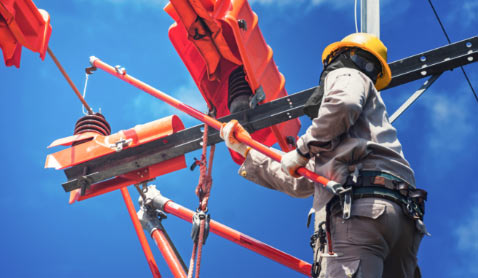TWS is a Great Training Option for Everyone
Learn more about how we can prepare you to advance your career.
Working as a lineworker is exciting and rewarding. Helping your community manage their electricity needs is noble work. However, some safety measures must be taken to stay safe. This article will review our safety message to those considering becoming lineworkers in Dallas because safety is our number one priority.
What Safety Certifications are A Part of the Lineworker Program?
We want you to be prepared since you will be climbing 30-foot utility poles and working with electrical infrastructure. In addition to classroom theory and hands-on experience, we prepare you for safety certifications. These lineworker certifications include:
Bucket Rescue
The bucket rescue training is compliant with OSHA regulations and ANSI standards for the safe rescue of workers exposed to electric shock. Coursework teaches you how to lower the boom in an emergency and two ways to extract an incapacitated person from a bucket. Upon completing the Electrical Lineworker program, you will be certified in bucket rescue.
Have You Considered a Career in the Skilled Trades?
Fill out the form to recieve a no obligation info packet.
Pole Top Rescue
When you complete the training program, you will be certified in pole-top rescue, as authorized by OSHA stipulations. You will have learned safety procedures for rescuing lineworkers and understand the dangers associated with working with powerlines.
First Aid
This Electrical Lineworker course at our Dallas Metro campus provides certification in First Aid as administered by the American Red Cross1. Training covers common scenarios with the knowledge, skills, experience, and confidence for workers to save lives and respond in emergencies.
CPR
Cardiopulmonary resuscitation is a lifesaving procedure for someone in cardiac arrest. When you are certified in CPR by the American Red Cross2 you will be able to help those who have lost consciousness. CPR can help the heartbeat circulate blood to the brain and other vital organs until emergency workers show up and take over lifesaving procedures.
Climbing
Certification in climbing prepares you to identify problems with overhead and underground powerlines, troubleshoot routine technical problems related to electrical and power distribution, and install, maintain, and repair power lines, transformers, and utility equipment using proper climbing procedures and techniques.
OSHA-10 Card
The OSHA-10 card3 is given to workers in high-risk industries who have completed 10 hours of OSHA outreach training. Electrical lineworkers must complete the training to become OSHA certified, which proves their proficiency in basic knowledge of workplace safety and health standards.
Want to Learn More?
Because becoming a lineworker is a hands-on job, technical training is typically required for anyone to enter this field. Many people invest in a trade program to learn the trade skills they need to be safe and effective as professionals.
To learn more about our Electrical Lineworker program at the Dallas Metro campus, contact us at Tulsa Welding School or call (214) 227-9911.







